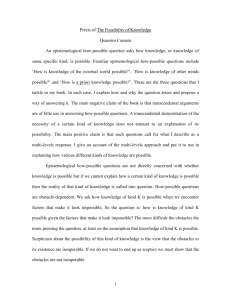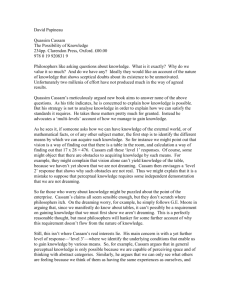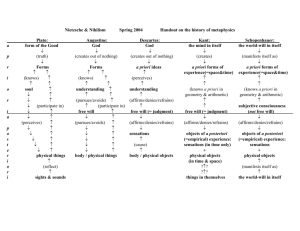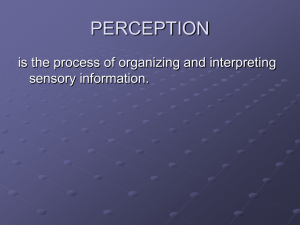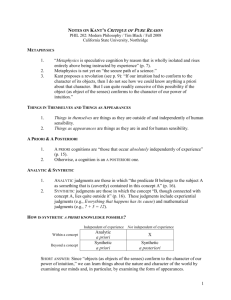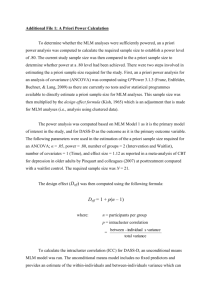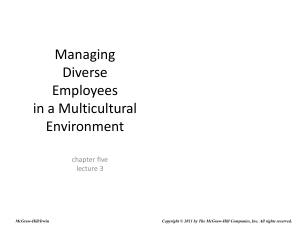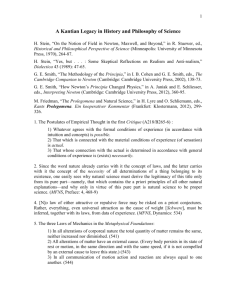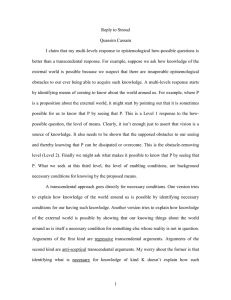Précis of The Possibility of Knowledge
advertisement
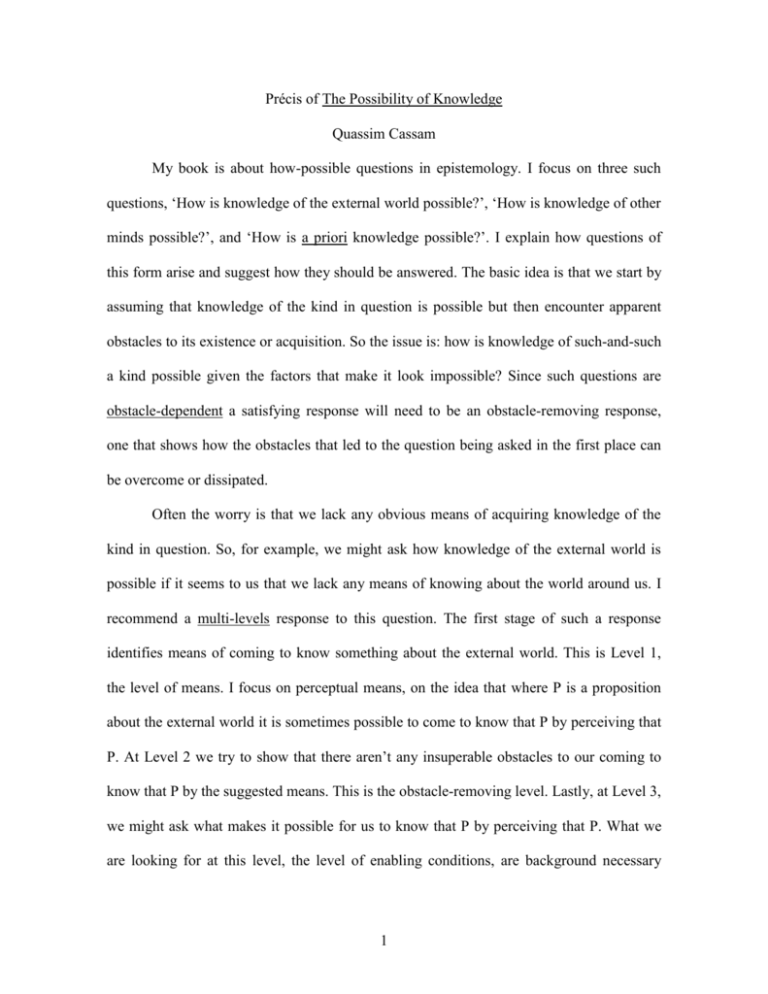
Précis of The Possibility of Knowledge Quassim Cassam My book is about how-possible questions in epistemology. I focus on three such questions, ‘How is knowledge of the external world possible?’, ‘How is knowledge of other minds possible?’, and ‘How is a priori knowledge possible?’. I explain how questions of this form arise and suggest how they should be answered. The basic idea is that we start by assuming that knowledge of the kind in question is possible but then encounter apparent obstacles to its existence or acquisition. So the issue is: how is knowledge of such-and-such a kind possible given the factors that make it look impossible? Since such questions are obstacle-dependent a satisfying response will need to be an obstacle-removing response, one that shows how the obstacles that led to the question being asked in the first place can be overcome or dissipated. Often the worry is that we lack any obvious means of acquiring knowledge of the kind in question. So, for example, we might ask how knowledge of the external world is possible if it seems to us that we lack any means of knowing about the world around us. I recommend a multi-levels response to this question. The first stage of such a response identifies means of coming to know something about the external world. This is Level 1, the level of means. I focus on perceptual means, on the idea that where P is a proposition about the external world it is sometimes possible to come to know that P by perceiving that P. At Level 2 we try to show that there aren’t any insuperable obstacles to our coming to know that P by the suggested means. This is the obstacle-removing level. Lastly, at Level 3, we might ask what makes it possible for us to know that P by perceiving that P. What we are looking for at this level, the level of enabling conditions, are background necessary 1 conditions for perceiving that P or for knowing that P by perceiving that P. The enabling conditions that are of special interest from a multi-levels perspective are a priori conditions, that is, ones that can be established by armchair philosophy. All this talk of different levels shouldn’t be taken too literally. It is more a matter of a satisfactory response to a how-possible question having to do a number of interconnected things during the course of a single evolving enquiry. Still, I maintain that the multi-levels structure helps us to see more clearly all the different things that are, or should be, going on when we respond to a how-possible question. A further issue concerns how far we need to go in order to deal with a how-possible question. For example, why do we need to say anything about the a priori enabling conditions for knowing that P by perceiving that P in order to explain how knowledge of the world around us is possible? Minimalists think there are no such conditions, and that we have already explained how knowledge is possible once we have come up with means of acquiring it. I call my view moderate anti-minimalism. This says that there are a priori conditions for the acquisition of perceptual knowledge, and that it is possible but not necessary to say what they are in the course of explaining how such knowledge is possible. According to Kant the a priori conditions for knowing that P by perceiving that P include spatial perception and categorial thinking. The Spatial Perception Requirement (SPR) says that in order to perceive that something is the case and thereby to know that it is the case one must be capable of perceiving spatially. The Categorial Thinking Requirement (CTR) says that in order to perceive that something is the case and thereby to know that it is the case one must use categorial concepts like substance, plurality, and causality in one’s thinking. A standard Kantian argument for SPR begins with the observation that in order to 2 know that some object a is F by perceiving that a is F one must perceive a. It then points out that in order to perceive a one must be able to differentiate it from other objects and from oneself, and that both these forms of differentiation depend on a capacity for spatial perception. I show that these claims are indefensible and propose a more direct argument for SPR that doesn’t turn on issues of differentiation. My discussion of CTR has the same basic structure. Again, I am critical of familiar Kantian arguments for this requirement, and conclude by putting forward my own defence of a modest version of CTR. The thought is that categorial thinking is necessary for the acquisition of perceptual knowledge because one needs concepts in order to perceive that a is F, and because a capacity for categorial thinking is necessary for concept-possession. In later chapters I use the multi-levels structure to explain how knowledge of other minds and a priori knowledge are possible. In the other minds case a major challenge is to identify means of coming to know of the existence and nature of other minds. I focus on the idea that perception is a source of our knowledge of other minds, though certainly not the only source. For example, I can sometimes know that another person is angry by seeing that he is. I defuse a range of obstacles that supposedly make it impossible to know what others are thinking or feeling by perceptual means and identify some of the enabling conditions for coming to know about other minds in this way. For example, it wouldn’t be possible for me to see that someone else is angry if he lacked spatial properties or if I couldn’t think of the state he is in when he is angry as a state of the very same type that I am in when I am angry. I argue that perception can provide us with a grasp of this sameness relation. The problem of a priori knowledge is to say what it is and to explain how we get it. On my account, a priori knowledge is knowledge that has its source in a non-experiential or 3 a priori way of coming to know. Such ways include reflection, reasoning and calculation. What we acquire by reasoning, reflecting or calculating is a priori knowledge of matters of fact so we should reject Hume’s thesis, which says that experience is our only source of knowledge of matters of fact. On the other hand, what makes it possible for us to acquire a priori knowledge of such matters is not, as Kant thinks, the dependence of world on mind but the dependence of mind on world. Specifically, it is the fact that many of the concepts that we exercise in reasoning, reflecting and calculating are world-involving. I conclude by distinguishing the multi-levels approach to a priori knowledge from rationalism. All the talk of background necessary conditions for gaining various different kinds of knowledge might give the impression that the multi-levels approach to how-possible questions has a transcendental orientation. This is not so. A transcendental approach to a question such as ‘How is knowledge of the external world possible?’ would either seek to identify necessary conditions for our having such knowledge or try to show that our having it is itself a necessary condition for a basic form of self-awareness. In my view, showing that knowledge of a certain kind is necessary for something else does not explain how it is possible. A genuine explanation will identify specific means of knowing and show how various obstacles to knowing by the suggested means can be overcome. The multi-levels approach does talk about necessary conditions at Level 3 but it allows that these might be means-specific. For example, spatial perception might be a condition necessary for the acquisition of knowledge by perceptual means without being a necessary condition for coming to know about the external world by non-perceptual means. In contrast, the focus in transcendental philosophy is on necessary conditions rather than means, and the necessary conditions it talks about are more general in scope. 4 5
